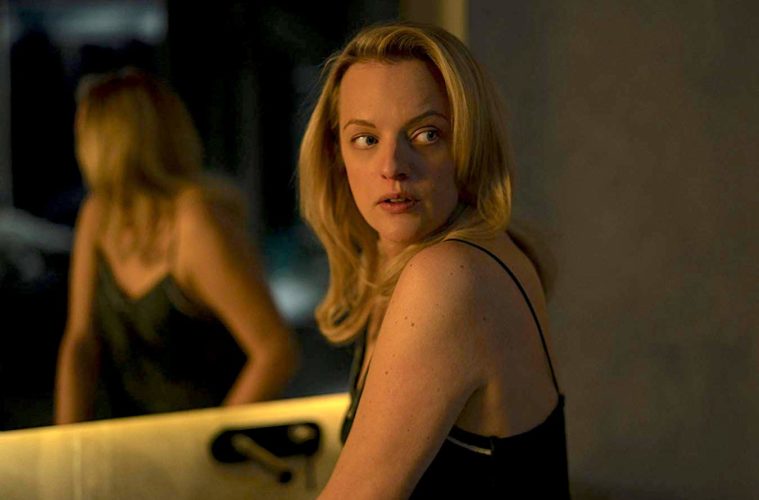Black waves crash against a craggy shore as we slowly pan in on a modern fortress standing on the bluffs. Cecilia Kass (Elisabeth Moss) is lying next to her sleeping husband, Adrian (Oliver Jackson-Cohen), and her face is etched with dread as she gets up, gathers her things and sneaks out of the strange, high-tech compound. Two things are immediately clear: first, Adrian is an engineer of some sort, perhaps a weapons designer, and second, Cecilia has just escaped with her life.
With this taut and suffocating opening, we enter the newest incarnation of The Invisible Man. Propelled by a portentous soundtrack by Benjamin Wallfisch (Blade Runner: 2049), this revisionist retelling of the H.G. Wells’ classic novella of science gone wrong meshes classic horror movie bleakness with contemporary aesthetics. Unlike some of the recent stabs at this story, particularly Paul Verhoeven’s 2000 mishap, Hollow Man, Australian writer-director, Leigh Whannell (Upgrade) reverses the focus from the existential dread of the inventor and places it on the victim, the inventor’s traumatized wife. Science is not the enemy this time, male toxicity is.
After escaping her spouse’s abusive clutches, Cecelia seeks help from her sister, Emily (Harriet Dyer), eventually finding shelter in the home of her detective friend, James (Aldis Hodge) and his teenage daughter, Sydney (Storm Reid). Two years later, Cecilia still tiptoes around their house, scared to even go outside in fear of Adrian’s retribution. Then she gets the news that he committed suicide. Cecilia’s paranoia is temporarily put to rest when she meets Adrian’s lawyer brother, Tom (a smarmy Michael Dorman), who tells her that Adrian is not only dead (with an urn of his ashes on the conference table), but also left her a $5 million fortune.
Cecilia’s relief doesn’t last long however, as she begins to feel her husband’s malignant presence in every corner of the detective’s house. She hears something, and turns, but there’s nothing there. Strange occurrences occur and Cecilia begins to question her own reason. Suddenly, we’re experiencing the effects of post-traumatic stress — the ethereal presence of evil, extreme paranoia, etc. Or is it something else?
Whannell realizes that horror has the ability to metaphorically expose the human condition, and he uses it to dissect the unique trauma women endure after surviving an abusive relationship. As we walk in Cecelia’s shoes, we question if her husband’s ghost is stalking her or if he is literally doing so by hiding inside an optics suite (a sort of high-tech invisible cloak) he created. Is he really dead? Is this all happening? Or is she merely imagining these things as a result of years of being gas-lighted and beaten?
The first half of The Invisible Man is magnetic, delivering some effective scares and acute psychological insight. Whannel has a knack for squeamish silences, unnervingly pushing his audience to squint, searching for an indiscernible presence in the room. The sound design is pristine and white-knuckled. This is patient and dynamic film-making.
Elisabeth Moss, in particular, continues her reign as one of our most interesting and uncompromising actresses. Frankly, The Invisible Man wouldn’t have been as memorable without her. As we’ve seen in Mad Men, The Handmaid’s Tale and recent turns in movies like Us and Her Smell, Moss is able to emote a rawness and vulnerability without a hint of exaggeration. In some of the best scenes of the movie, her agony is so naked and alarming, as if she’s waiting for the next blow to land.
It would have been more effective however, if the script explored Cecelia’s psychological breakdown a little deeper, delving into what drives her sanity to dwindle and how her situation reflects the tyrannical aspects of a masculine world. The Invisible Man could’ve been Repulsion for the #MeToo era. Instead the movie takes the safe, audience-friendly route, dissolving into some far-fetched scenarios and questionable plot holes. The script could’ve used one more draft and lost some of its bombastic, action-film threads. Nevertheless, the confident directing and excellent performances keep us locked in until the last frame.
Advertising disclosure: We may receive compensation for some of the links in our stories. Thank you for supporting LA Weekly and our advertisers.

